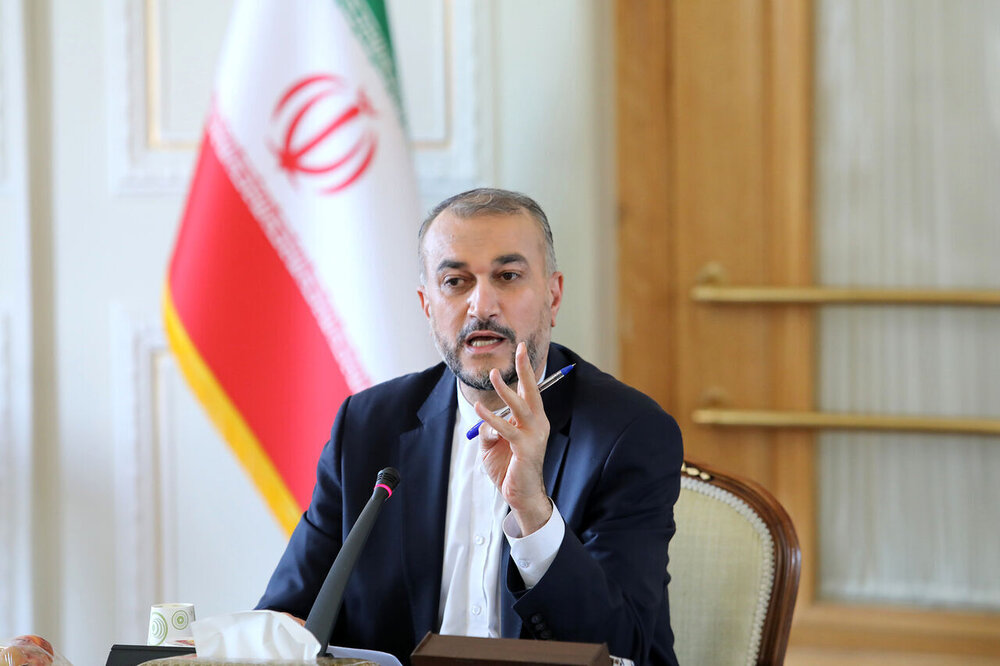Violence and terror should be confronted, Iran tells France

TEHRAN - Iranian Foreign Minister Hossein Amir Abdollahian held talks with his French and Bulgarian counterparts via phone on Tuesday. He also held a meeting with the head of the Iran-Armenia parliamentary friendship group on the same day.
During the call with his French counterpart, Catherine Colonna, Amir Abdollahian issued a warning that Tehran will retaliate if the European Union (EU) takes any restrictive action against the Islamic Republic due to current unrest in the country.
Writing on his Twitter account, the senior Iranian diplomat also said he and Colonna concurred that "violence and terror should be confronted" and that "mutual respect and benefit override relations."
“I objected to Europe's interference in our internal affairs,” he said, stressing that Iran will reciprocate if EU restrictive measures applied,” Amir Abdollahian wrote.
In a report on its website the Iranian Foreign Ministry also said Amir Abdollahian had told the French foreign minister that Iran will not allow local or foreign sides “to target the national security of the country.”
Pointing to the West’s double standards, Amir Abdollahian said, “It is astonishing that countering riots is considered good in Europe but it is considered ‘suppression’ in Iran,” according to the ministry.
In response to the recent unrest in Iran, the European Parliament passed a resolution on Thursday urging EU officials to implement sanctions against Iranian officials who are thought to have participated in an alleged crackdown on protestors.
Iran's Foreign Ministry denounced the resolution as "meddlesome" and "baseless," promising to respond to any restrictions placed on the Iranian people in an "appropriate" response.
The Iranian Foreign Ministry has already summoned France's chargé d'affaires to Tehran to denounce the French government's meddling in Iranian domestic matters and its stance on riots fueled by counterrevolutionary groups across the country.
The Islamic Republic has also summoned the ambassadors of Sweden, Norway, and the United Kingdom to express displeasure with the respective governments' attitudes on recent unrest in Iran and their reluctance to defend Iranian embassies.
“Iran, Bulgaria vow to broaden their fraternal ties”
The Iranian and Bulgarian foreign ministers celebrated the 125th anniversary of the establishment of diplomatic ties between their countries and saw the occasion as an excellent chance to further bilateral ties.
Amir Abdollahian and his Bulgarian counterpart Nikolay Milkov discussed recent regional and global events as well as their bilateral relations.
Both sides acknowledged the 125th anniversary of diplomatic ties between Iran and Bulgaria presents an excellent chance for more extensive growth.
The foreign ministers of the two countries, meanwhile, mulled over the different forms of economic cooperation and expressed willingness to work together to conduct the 25th Iran-Bulgaria joint economic cooperation commission soon.
Bulgaria agreed to participate in the IAEA inspection of Iran's nuclear program in a fair and forthright manner.
For his part, Milkov hailed some of the suggestions made for everyone to return to the JCPOA and expressed optimism for its swift recovery.
“Iran opposes changes to regional boundaries”
In a meeting with the head of the Armenian parliamentary friendship group, Amir Abdollahian expressed Tehran's opposition to any change in the border or geopolitical status and the Islamic Republic's support for a peaceful resolution of the disputes between Armenia and Azerbaijan.
The top Iranian diplomat also mentioned the positive and developing bilateral connections and stated that the parliamentary friendship groups have a very significant role to play in the development of these relations.
According to Iran's foreign minister, enabling transportation and transit by lowering the expenses for Iranian businesses engaged in carrying out Armenia's economic and infrastructural projects is also crucial.
Amir Abdollahian referred to Iran's fundamental principles of diplomacy, which respect each country's territorial integrity and national sovereignty, and asked for a peaceful resolution of the conflicts between the Republic of Armenia and the Republic of Azerbaijan.
He also emphasized that Iran is opposed to any kind of alteration to international borders and to changes to the region's geopolitical map.
Furthermore, the Armenian side spoke of the positive ties between the two nations and praised Iran's positions on regional affairs.
He also expressed appreciation for Iranian businesses' enthusiasm in working with Armenia on significant projects.
The Armenian delegation mentioned a myriad of challenges, including speeding up efforts to ease travel and transit between the two countries, business transactions, and citizen visits.
Leave a Comment